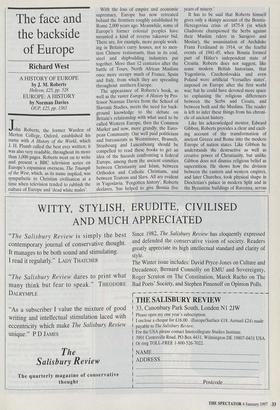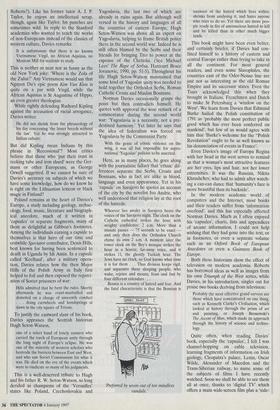The face and the backside of Europe
Richard West
John Roberts, the former Warden of Merton College, Oxford, established his name with A History of the World, which J. H. Plumb called the best ever written; it was also very readable, throughout its more than 1,000 pages. Roberts went on to write and present a BBC television series on Europe's expansion overseas, The Triumph of the West, which, as its name implied, was sympathetic to Christian civilisation at a time when television tended to rubbish the culture of Europe and 'dead white males'. With the loss of empire and economic supremacy, Europe has now retreated behind the frontiers roughly established by Rome 2,000 years ago. Meanwhile, some of Europe's former colonial peoples have mounted a kind of reverse takeover bid. There are, for example, more people work- ing in Britain's curry houses, not to men- tion Chinese restaurants, than in its coal, steel and shipbuilding industries put together. More than 12 centuries after the battle of Tours, North African Muslims once more occupy much of France, Spain and Italy, from which. they are spreading throughout northern Europe. The appearance of Roberts's book, as well as the vaster Europe: A History by Pro- fessor Norman Davies from the School of Slavonic Studies, meets the need for back- ground knowledge to the debate on Britain's relationship with what used to be called Western Europe, then the Common Market and now, more grandly, the Euro- pean Community. Our well paid politicians and bureaucrats in Westminster, Brussels, Strasbourg and Luxembourg should be compelled to read these books to get an idea of the hazards confronting a federal Europe, among them the ancient enmities between Christianity and Islam, between Orthodox and Catholic Christians, and between Teutons and Slays. All are evident in Yugoslavia. 'Forgotten history', Roberts declares, 'has helped to give Bosnia five years of misery.' It has to be said that Roberts himself gives only a skimpy account of the Bosnia- Hercegovina crisis of 1875-8 (in which Gladstone championed the Serbs against their Muslim rulers in Sarajevo and Mostar), the assassination of Archduke Franz Ferdinand in 1914, or the fearful events of 1941-45, when Bosnia formed part of Hitler's independent state of Croatia. Roberts does not suggest, like some modern British historians, that Yugoslavia, Czechoslovakia and even Poland were artificial 'Versailles states', imposed on Europe after the first world war; but he could have devoted more space to explaining the religious differences between the Serbs and Croats, and between both and the Muslims. The reader is left to infer these things from his chroni- cle of ancient history. Like his acknowledged mentor, Edward Gibbon, Roberts provides a clear and excit- ing account of the transformation of ancient Greece and Rome into the modern Europe of nation states. Like Gibbon he understands the destructive as well as creative power of Christianity, but unlike Gibbon does not dismiss religious belief as superstition. He shows how the division between the eastern and western empires, and later Churches, took physical shape in Diocletian's palace in modern Split and in the Byzantine buildings of Ravenna, across the Adriatic. He shows how the Frankish empire, based on Charlemagne's military power and the spiritual energy of the Cluniac monks, revived the papacy in the 10th and 11th centuries. It is curious to observe how the heartland of the Frankish empire corresponded to that of the Euro- pean Commission, either side of the lower Rhine.
Roberts explains how Charlemagne pioneered Germany's military Drang nach Osten down the Danube but does not suffi- ciently emphasise his role in promoting religious changes, such as the Tilioque' clause, which eventually led to the Great Schism of 1054, and still divides Serbs from Croats. In view of the recent sex scandals involving the Roman Catholic Church, it is a pity that he does not explain how or why the papacy brought in the celibacy of the clergy. Nor does he convey the separate doctrine, culture and character of the Orthodox Church as he later does for the Lutherans and Calvinists. He reworks material from A History of the World and his television series to give a first-rate account of Europe's expansion overseas, as well as the growth of national rivalries nearer to home. He observes that the stolid Dutch, of all people, were the first to invent a heroic history:
They exploited Hispanophobia to forge unity; there was a rumour that Philip II had sen- tenced everyone in the Netherlands to death (probably less than 4,000 'heretics' actually died). Soon its citizens discovered a national past (much as decolonised Africans have done in this century) and celebrated the virtues of Germanic tribesmen dimly dis- cernible in Roman accounts of rebellion; relics of such enthusiasm remain in the paint- ings commissioned by Amsterdam magnates depicting `Batavian' attacks upon Roman camps (in the era we remember for the works of Rembrandt).
Just as Gibbon, in footnotes, made fun of the Christian religion, so Roberts is scathing about the rationalists:
It is always worth recalling that among the spectators who paid large sums for good seats from which to watch the appalling tor- ments inflicted on Damiens, the would-be assassin of the French king [Louis XV], were ladies of the most brilliant court in Europe, the social apex of France, the country above all associated with Enlightenment, whose lan- guage gave its ideas international currency.
He calls the guillotine used in the Terror a characteristic product of pre-revolutionary enlightenment, combining as it did technical efficiency with benevolence in the swift, sure death it afforded its victims.
Roberts's own political views may come across in the accolade for Edmund Burke's Reflections on the Revolution in France, published in 1790:
As might easily be inferred from [Burke's] former role as defender of the rights of the American colonists, the book was far from a mindless defence of privilege. In it a conser- vative stance shook itself clear of the legalis- tic defence of institutions and expressed itself in a theory of society as a creation of more than will and reason and as the embodiment of morality. The revolution, by contrast, was condemned as the expression of the arrogance of the intellect, of arid rationalism, and of pride — to the Christian, deadliest of all the sins.
In one of his entertaining asides (the equivalent of Gibbon's footnotes) he recounts that during the reign of Louis- Philippe of France
one prominent French politician told his fellow-countrymen to enrich themselves a recommendation much ridiculed and mis- understood, though all he was trying to do was to tell them that the way to obtain the vote was through the qualification which a high income conferred.
The idea that only the rich should have the vote is admirable, provided that only the rich pay taxes. At the very same time, the 1830s, the British were setting out on the road towards universal suffrage and, eventually, universal income tax. In British local government, only the rate-payers voted in council elections until quite recent times. Town hall corruption started when all adults were given the vote. Few com- mentators or politicians even know when the change occurred. Nor does Roberts mention the date, although in another con- text he remarks that 'King Alfred's shire structure lasted till 1974'.
When dealing with the question of how to define Europe, Roberts refers to the 19th-century Austrian statesman, Met- ternich (a Rhinelander by birth), who said that Asia began not far from his office win- dows in Vienna. 'There is something to be said for that,' he continues, 'but it is a view based on history rather than topography.' Norman Davies, the author of the superb God's Playground and other studies of Pol- ish history, agrees with G. K. Chesterton that Warsaw is the centre of Europe. He reproduces a 16th-century map of 'Queen Europe', with her head on the Atlantic, her face in Spain, her breasts in France and Germany, her thighs in Poland and Hun- gary, and her feet on the Ural mountains. He quotes the lines of a 19th-century Polish poet, Julius Slowacki:
If Europe is a nymph, Then Naples is her bright blue eye, And Warsaw is her heart. Sebastopol, Mitau, Odessa: These are the thorns in her feet.
Paris is the head, London the starched collar, And Rome the scapulary.
In a witty introduction designed to justify this Polonocentric view of Europe, Davies hits out at historians of the occidental, Marxist, nationalist, `postmodernise and `deconstructionise schools, with a milder warning against the perils of simple narra- tion (perhaps a pre-emptive strike against Roberts?). Like his former tutor A. J. P. Taylor, he enjoys an intellectual scrap, though, again like Taylor, his punches are sometimes wild. In reply to the Stanford academics who wanted to teach the works of non-Europeans instead of the classics of western culture, Davies remarks;
It is unfortunate that there is no known Vietnamese Virgil, no African Aquinas, no Mexican Mill for students to study.
This is neither as neat nor as funny as the old New York joke: 'Where is the Zola of the Zulus?' Any Vietnamese would say that Nguyen Du's epic poem Kim Van Kieu is quite on a par with Virgil, while the African Aquinas is St Augustine of Hippo, an even greater theologian.
While rightly defending Rudyard Kipling against the accusation of racial arrogance, Davies writes:
He did not shrink from the phraseology of his day concerning 'the lesser breeds without the law'. Yet he was strongly attracted to Indian culture.
But did Kipling mean Indians by this phrase in 'Recessional'? Most critics believe that those who 'put their trust in reeking tube and iron shard' were the Ger- mans or other Europeans, as George Orwell suggested. If we cannot be sure of Davies's accuracy on subjects of which we have some knowledge, how do we know he is right on the Lithuanian lexicon or black magic in Finland?
Poland remains at the heart of Davies's Europe, a study including geology, archae- ology, food, music, literature and biograph- ical anecdote, much of it written in `capsules' or separate fragments, many of them as delightful as Gibbon's footnotes. Among the individuals earning a capsule to themselves is that hero of our time and erstwhile Spectator contributor, Denis Hills, best known for having been sentenced to death in Uganda by Idi Amin. In a capsule called 'Keelhaul', after a military opera- tion, Davies relates how the then Major Hills of the Polish Army in Italy first helped to foil and then exposed the repatri- ation of Soviet prisoners of war:
Hills admitted that he bent the rules. Shortly afterwards he was court-martialled and demoted on a charge of unseemly conduct . . . doing cartwheels and handsprings at dawn in the city square of Trieste.
To justify the eastward slant of his hook, Davies appraises the Scottish historian Hugh Seton-Watson,
one of a select band of lonely runners who carried the torch of European unity through the long night of Europe's eclipse. He was one of the minority of western scholars who bestrode the barriers between East and West, and who saw Soviet Communism for what it was. He died on the eve of the events which were to vindicate so many of his judgments.
This is a well-deserved tribute to Hugh and his father R. W. Seton-Watson, so long derided as champions of the 'Versailles' states like Poland, Czechoslovakia and Yugoslavia, the last two of which are already in ruins again. But although well versed in the history and languages of all the countries of eastern Europe, Hugh Seton-Watson was above all an expert on Yugoslavia, helping to frame British policy there in the second world war. Indeed he is still often blamed by the Serbs and their friends for bringing Tito to power at the expense of the Chetniks. (See Michael Lees' The Rape of Serbia, Harcourt Brace Jovanovic, 1990, pp. 51-5). Throughout his life Hugh Seton-Watson maintained that some kind of Yugoslav unity was needed to hold together the Orthodox Serbs, Roman Catholic Croats and Muslim Bosnians.
Norman Davies occasionally grasps the point but then contradicts himself. He quotes with approval the wise remark of a commentator during the second world war: 'Yugoslavia is a necessity, not a pre- destined harmony.' Yet later he says that the idea of federalism was forced on Yugoslavia by the Communist Party:
With the genie of ethnic violence on the wing, it was all but impossible for supra- national 'Yugoslav' policies to be asserted.
Here, as in many places, he goes along with the journalistic fallacy that 'ethnic' dif- ferences separate the Serbs, Croats and Bosnians, who in fact are alike in blood, language and even appearance. Yet in his `capsule' on Sarajevo he quotes an account of the city by the novelist No Andric, who well understood that religion lay at the root of the hatreds:
Whoever lies awake in Sarajevo hears the voices of the Sarajevo night. The clock on the Catholic cathedral strikes the hour with weighty confidence: 2 a.m. More than a minute passes — 75 seconds to be exact and only then does the Orthodox Church chime its own 2 a.m. A moment later the tower clock on the Bey's mosque strikes the hour in a hoarse, far-away voice, and it strikes 11, the ghostly Turkish hour. The Jews have no clock, so God knows what time it is for them . . . Thus division keeps vigil, and separates these sleeping people, who wake, rejoice and mourn, feast and fast by four different calendars ...
Bosnia is a country of hatred and fear. And the fatal characteristic is that the Bosnian is
`Preferred by seven out of ten mindless vandals.' unaware of the hatred which lives within, shrinks from analysing it, and hates anyone who tries to do so. Yet there are more peo- ple ready in fits of unconscious hatred to kill and be killed than in other much bigger lands.
This book might have been even better, and certainly briefer, if Davies had con- fined himself to a history of eastern and central Europe rather than trying to take in all the continent. For most general readers, and even some Slavophiles, the countries east of the Oder-Neisse line are just not as interesting as the old Roman Empire and its successor states. Even the Tsars acknowledged this when they brought in Italians, Frenchmen and Dutch to make St Petersburg a 'window on the West'. We learn from Davies that Edmund Burke hailed the Polish constitution of 1791 as `probably the most perfect public good which has ever been conferred on mankind', but few of us would agree with him that 'Burke's welcome for the "Polish Revolution" ought to be as well known as his denunciation of events in France'.
Even Davies's image of Europa Regina with her head in the west serves to remind us that a woman's most attractive features are her eyes, lips and hair, not her lower extremities. It was the Russian, Nikita Khrushchev, who had to admit after watch- ing a can-can dance that 'humanity's face is more beautiful than its backside'.
In the modern academic world of computers and the Internet, most books and their readers suffer from 'information overload', and this has especially affected Norman Davies. Much as I often enjoyed his 'capsules', charts, lists and appendices of arcane information, I could not help wishing that they had gone into the text, or in footnotes, or even a separate volume such as an Oxford Book of European Anecdotes or even a Guinness Book of Europe.
Both these historians show the effect of television on modern academia. Roberts has borrowed ideas as well as images from his own Triumph of the West series, while Davies, in his introduction, singles out for praise two books deriving from television: Probably the most effective grand surveys are those which have concentrated on one thing, such as Kenneth Clarke's Civilisation, which looked at history through the prism of art and painting, or Joseph Bronowski's The Ascent of Man, which made its approach through the history of science and techno- logy.
Quite often, when reading Davies' book, especially the 'capsules', I felt I was channel-hopping on cable television, learning fragments of information on Irish geology, Cleopatra's palace, Lenin, Oscar Wilde, Alexander of Macedon and the Trans-Siberian railway, to name some of the subjects of films I have recently watched. Soon we shall be able to see them all at once, thanks to 'digital TV' which offers a main wide-screen film plus a 'side-





























































 Previous page
Previous page